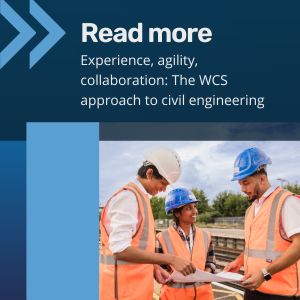Delivering successful infrastructure projects relies on more than technical understanding; it requires teams with confidence, adaptability, and a commitment to continuous growth.
At Whitfield Consulting Services (WCS), we invest in people from the start of their engineering careers through to senior leadership roles. By providing structured pathways, mentoring, and hands-on experience, we help engineers develop their skills, achieve professional milestones, and take on increasing responsibility. This approach benefits our clients, strengthens our teams, and contributes to addressing skills gaps within the industry, preparing the next generation of engineers for the challenges ahead.
Career pathways
Structured progression routes allow engineers to achieve professional milestones systematically. Shane Govender, Principal Civil Engineer, is our latest team member to attain Chartered status, achieving Membership of the Institution of Civil Engineers (ICE) via Mutual Recognition with the Engineering Council of South Africa (ECSA) and the South African Institution of Civil Engineering (SAICE).
Shane credits WCS’s support and mentoring as key to his success:
“At WCS, I’ve been encouraged to lead teams and expand my skillset. The culture is very supportive. That freedom has given me a well-rounded experience and kept my technical ability sharp while also building my skills in contracts, client liaison, and team leadership,” observes Shane.
He adds, “Achieving chartership was an important milestone for me. It’s not just a personal achievement — it’s about upholding the dignity of the profession and setting the right example. I want to guide the next generation to follow a steady path, learn good habits from the outset, and develop into well-rounded engineers who lead with integrity.”
WCS has an Institution of Civil Engineers (ICE) Training scheme in place, and, with mentorship provided by supervising civil engineers, supports members in progressing toward Chartered Engineer (CEng MICE) status with ICE. WCS also has strong links with the Institution of Structural Engineers (IStructE), with several team members involved in local committees.
Supporting early engineering careers
Graduates contribute fresh perspectives, while experienced colleagues provide technical guidance and strategic insight. Mentorship and collaborative knowledge transfer enable early-career engineers to make meaningful contributions from their first project.
We ensure that graduates, younger engineers, and CAD technicians gain exposure to different teams and project types. This broadens their knowledge base, familiarises them with varied industry practices, and equips them with the confidence to take on increasingly complex responsibilities.
Mohamed Omar, Senior Structural Engineer
Mohamed Omar joined WCS as a graduate engineer in 2022 and has grown into a senior role, leading complex schemes with skill and confidence. He is currently working within our Bridge Structures team on National Grid’s Uxbridge Moor substation project, contributing to the scheme for the project’s main contractor, Murphy. Uxbridge Moor is set to become the largest new substation on the UK transmission network by capacity.
“Since joining WCS, I’ve been given incredible opportunities to grow, learn, and take on leadership roles in various complex schemes, including the revitalisation of the Downs Park Road Overbridge,” Mohamed shares.
His role on the Downs Park Road Overbridge was a key factor in him being named a finalist for New Civil Engineer’s Bridge Engineer Rising Star Award 2025; learn more about the project here.
Deepening knowledge and capability
Continuous professional development underpins WCS’s operational approach. Engineers participate in a broad programme of CPD sessions, which included internal shared knowledge sessions as well as supplier-led technical briefings, and on-site, hands-on training.
Depending on project requirements, colleagues also attend specialist training such as Basic Track Awareness (BTA) and Personal Track Safety (PTS), as well as electrical and substation-specific courses. This includes the Basic Electrical Competence for Access, Movement & Egress (BESC:AME) Substation Entry Training Course, which equips engineers with the essential skills and safety knowledge to work safely within live substations, and the National Grid Person course, which provides the necessary induction and safety training to access National Grid sites.
In the office, CPD sessions often feature external companies presenting their products, systems, and technologies. These sessions give teams the chance to explore practical applications, ask technical questions, and consider how emerging solutions can support project delivery.
Knowledge transfer between colleagues is equally important. Monthly shared knowledge sessions, lessons learnt workshops, and team-led presentations ensure insights from one project inform the next, building both individual and collective proficiency across disciplines.
Inspiring the next generation
This year, we welcomed our very first apprentice – Fortune Ebeleghe, from South Thames College – who has joined us while undertaking the Civil Engineering Technician course programme. Fortune’s arrival marks an exciting milestone in our journey to create more accessible pathways into the profession.
Our commitment to developing future talent extends far beyond apprenticeships. We engage with students and young people who may become the civil engineers of the future, providing work placements ranging from one-week school experiences to 8 weeks or a year-long placement as part of the Surrey ICE Scholarship scheme programmes. These placements offer hands-on exposure to sustainability practices, teamwork, and digital design tools.
In a recent feedback survey, all students reported feeling supported throughout their placement and said they were given opportunities to learn new skills:
- “Everyone was beyond friendly and helpful.”
- “We had lots of help with all of the activities we did.”
- “I was able to make two structures on two software platforms in two days because of the help from engineers.”
Alongside placements, WCS also participates in career fairs, guest lectures, and initiatives such as the Women’s Engineering Society’s Lottie Tour, helping to raise awareness of engineering careers, particularly among underrepresented groups.
“One of the best parts of working at WCS is knowing that I can do more than just delivering design,” says Celine Mahfoud, Civil/Structural Design Engineer. “I am encouraged every day to give back to the community. I value the opportunity to present at schools and universities, where I can inspire the next generation of engineers and encourage young girls to consider a career in engineering.”
WCS also engages through initiatives such as the Kingston University Beyond Barriers mentorship programme providing mentorship to students and ICE Girl Guide Scout programme, helping them to organise activities at one of the local clubs.
This work saw WCS shortlisted for the Excellence in Outreach accolade at the Inspiring Women in Construction & Engineering Awards 2025.
Asa Whitfield, Managing Director at WCS, reflects, “Our ambition is to inspire the next generation to join our profession. We aim to make engineering accessible to everyone, to share knowledge and experience, and to create a more sustainable world with the help of younger generations.”
The WCS approach
“At WCS, our approach begins and ends with the team. We learn together, we grow together, and we celebrate our successes together,” says Dr Natalja Petkune, Director at WCS.
Structured support, clear pathways for growth, and a culture that encourages ambition and curiosity underpin every aspect of our work. Each promotion, qualification, and lesson shared strengthens our technical delivery and collective knowledge.
If you’re looking for a dependable partner for your next Rail or Power & Energy project, contact WCS to see how we can support you. Get in touch.

